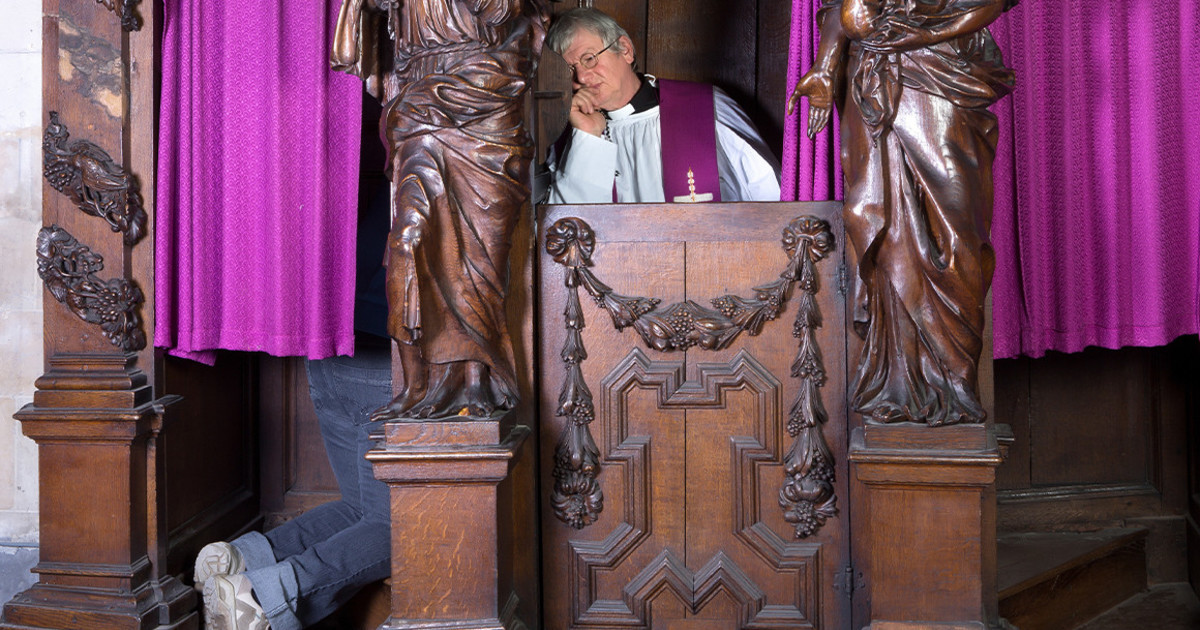Despite the Catholic Church’s requirement that Catholics go to confession at least once a year — with more frequent confession highly encouraged, and required if a Catholic is conscious of mortal sin and wishes to receive Communion — Catholics in the U.S. don’t go to confession very often. Polling from EWTN News/RealClear Opinion Research (EWTN is CNA’s parent company) has consistently shown that over half of U.S. Catholics go to confession either less than once a year or not at all.
Yet within this year’s nationally representative EWTN poll results was one rather surprising detail: The number of Catholics who reported going to confession regularly is going up. Although 18% of the Catholics surveyed this year said they never go to confession and 24% go less than once a year, this actually represents an increase over poll numbers from 2022. That year, 28% of respondents said they went to confession less than annually and 35% said they never went at all.
Fully 42% of the Catholics surveyed in 2024 said they go to confession at least once a year — in line with the Church’s requirements — while 16% go to confession at least once a month. In the 2022 survey, just 10% of respondents that year said they went to confession monthly.
'Leaving the Light On'
In some corners of the country — in dioceses that have consciously sought to promote the sacrament of confession in recent years — the statistics were a welcome sign that their efforts are working.
The Archdiocese of Washington and the Diocese of Arlington, Virginia — both of which share the bulk of the Washington, D.C., metropolitan area — jointly created an initiative more than a decade ago designed to promote the sacrament of confession called “The Light Is On for You.” The idea, which has since been copied by more than a half-dozen other dioceses nationwide, is a simple one: During the penitential seasons of Lent and Advent, every parish in the diocese opens its doors for several hours each Wednesday evening to allow people the opportunity to seek God’s mercy.
In Arlington and Washington, the dioceses have promoted the initiative widely with ads on buses, radio, and TV spots, and other media that are designed to have a broad reach beyond Catholics who are regularly in the pews.
Father Donald Planty, pastor at St. Charles Borromeo Parish in Arlington, told CNA he has seen the initiative lead to an increased demand for confessions — so much so that at his parish they decided to continue offering confessions every Wednesday night of the year.
And the results have been positive: Planty said he and his fellow priests at the parish have heard an estimated 25,000 total confessions on Wednesday nights since 2014. And that doesn’t count all the confessions heard on the other four days of the week they offer it at St. Charles.
Father Planty said they’ve found a simple but winning formula to get people to come back to the sacrament: Make confession more available and preach on it at Mass. “It’s like a field of dreams: If you build it, they will come. If you offer it, they will come. It’s very simple,” he said.
He emphasized for fellow priests the importance of putting people at ease when they arrive in the confessional, especially if they’ve been away from the sacrament for a while. He said he welcomes penitents to the confessional with a variation on the phrase he also preaches on during Mass, assuring them that the Lord welcomes them “with open arms.”
“‘In the sacrament of penance, the Lord Jesus welcomes you with open arms. He forgives your sins, and he forgets them. And you start a new life with his love, with his grace in your heart,’” Father Planty said, reciting the typical phrase he offers in his homilies. “I often add, especially when I’m preaching: ‘There is no unforgivable sin. There is no unforgivable sin. There is no unforgivable sin.’ I repeat it three times. There’s nothing to be afraid of, and everything to gain [by coming to confession],” Father Planty explained.
Variations on the “Light Is On for You” initiative have been implemented in dioceses all across the country: for instance in Dallas; Grand Rapids, Michigan; Portland, Maine; Toledo, Ohio; Scranton, Pennsylvania; Fort Wayne-South Bend, Indiana; and Erie, Pennsylvania. It has even inspired bishops abroad.
Danielle Cummings, chancellor and communications director for the Diocese of Syracuse, New York, similarly told CNA that they have seen a marked increase in demand for confessions since they began offering “The Light Is On for You” several years ago.
And like in Washington and Arlington, the Syracuse Diocese buys time in major media markets to promote the initiative in the hopes that people who have been away from the sacrament for a while will come back.
Cummings said they have found that people far and wide see and hear the ads inviting them back to confession and it “resonates in their heart” as something they ought to be doing. It’s not a typical “penance service,” she added — it’s just an open church building with a prayerful atmosphere inside and priests available to hear confessions when people are ready.
Every year after the initiative takes place, Cummings said she asks pastors for anecdotal stories about how it went. She said she has heard remarkable reports, including Catholics returning to confession after 50 years away and parishes adding permanent confession times due to increased demand after participating. “It has been just an overwhelming experience here in the diocese. I would recommend it to any diocese to begin this initiative,” Cummings said. “What it really [does] is make people remember going to confession and remember how relieved, how the burden has been lifted, when they walk out of the confessional.”
Similar to Father Planty, Cummings said they have found that the best advice they can give for dioceses wanting to replicate their success is: “Keep it simple.” “I would be very surprised to hear that any diocese [that has done this] has not seen a change in the number of confessions being sought after doing this kind of initiative,” Cummings said.
Rediscovering the Sacrament
In a chapter dedicated to the sacrament of confession, Father Menezes lays out some of the most common reasons that Catholics avoid the sacrament: for example, they fear being judged or scolded for their sins; they don’t realize the importance of confession; or they consider confession unnecessary. But Father Menezes said he believes that regular confession and Eucharistic participation are essential for spiritual maintenance and growth, contributing to a person’s overall sanctity as well as his or her peace of mind.
“These two sacraments, confession and Eucharist, are precisely the two of the seven that sustain us in our daily vocation and walk in life — regardless of what that may be: single, married, widowed, consecrated religious, diocesan priest, etc. It’s a tragedy that some Catholics stay away from confession for so long,” he commented to CNA.
“I’m a huge advocate of monthly confession, 12 times a year, faithfully … The main purpose of a monthly confession is precisely to have only venial sins to confess. Hopefully, those who go monthly won’t have mortal sins to confess, at least not often. In other words, it’s the practice of monthly confession, per se, that’s helping to keep them away from committing mortal sin.”
Oftentimes, a big factor keeping people from seeking the sacrament is unavailability, Father Menezes noted. While acknowledging that many priests are overwhelmed and may not feel they can offer confession more frequently, he encouraged priests to make more time for this sacrament anyway, assuring them that God will lighten their workload in other ways.
“We need to make ourselves more available as priests. This is why the programs that do exist that really promote confession, like [‘The Light Is On for You’], that several dioceses have taken on, is a wonderful, wonderful thing,” he said. “Regarding the pastor who’s alone with no associate pastors to aid him — hopefully he’ll feel compelled to make more time to administer the sacrament of reconciliation; in doing so, I’m confident that he will discover that God cannot be outdone in his generosity,” he said. “God will help lighten up his schedule in other ways if he makes time to hear the confessions of the souls of his parishioners, because he’s first and foremost the guardian and caretaker of the souls in his parish.”
Laying out the nine chief benefits of going to confession, Father Menezes reiterated in his book how beneficial it is to go to the sacrament monthly, if possible. He encouraged Catholics to make use of an examination of conscience brochure available on the Fathers of Mercy website, which serves as both a guide for self-reflection and a mini-catechism, helping individuals prepare for confession effectively. His order distributes about 600,000 of these brochures annually, Father Menezes said.
“Monthly confession also brings you great peace with your past … Each monthly confession literally only looks back on that past four- to five-week period of your life. And there’s nothing more great than having that solidified, moral compass that, ‘Yes, I’m totally, totally at peace with my past,’” he explained to CNA. “Regular Eucharist and regular confession helps create that solid moral compass in your life. There‘s no need to ever look back anymore.”
Confession: A Renewed Focus on Reconciliation
As these initiatives gain momentum, the Catholic Church continues to emphasize the importance of confession in the spiritual journey. The sacrament of reconciliation, as it is also known, remains a cornerstone of the Catholic faith, offering a path to healing, forgiveness, and a renewed relationship with God. The Church’s commitment to promoting confession reflects a recognition of its vital role in helping individuals find solace and spiritual growth.
The recent increase in confession is a hopeful sign for the Catholic Church. It indicates a renewed focus on the sacrament’s significance and a willingness among Catholics to seek spiritual guidance and forgiveness. The Church’s efforts to make confession more accessible and to encourage its practice are clearly yielding positive results. The future of confession appears bright, as Catholics continue to rediscover its transformative power in their lives.

















